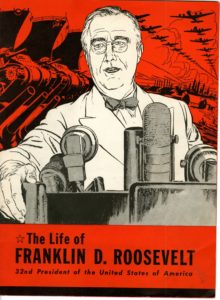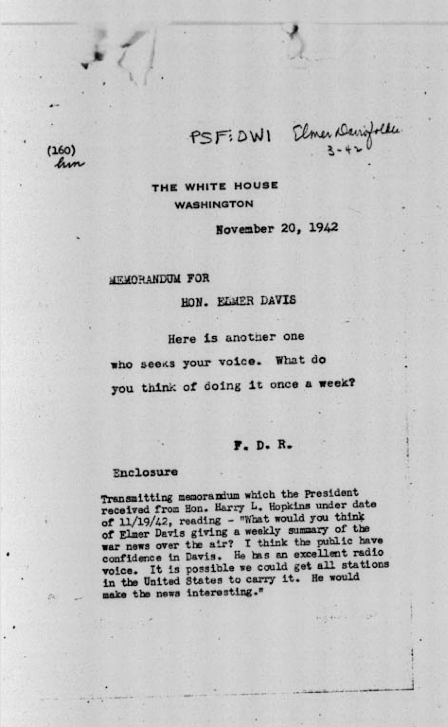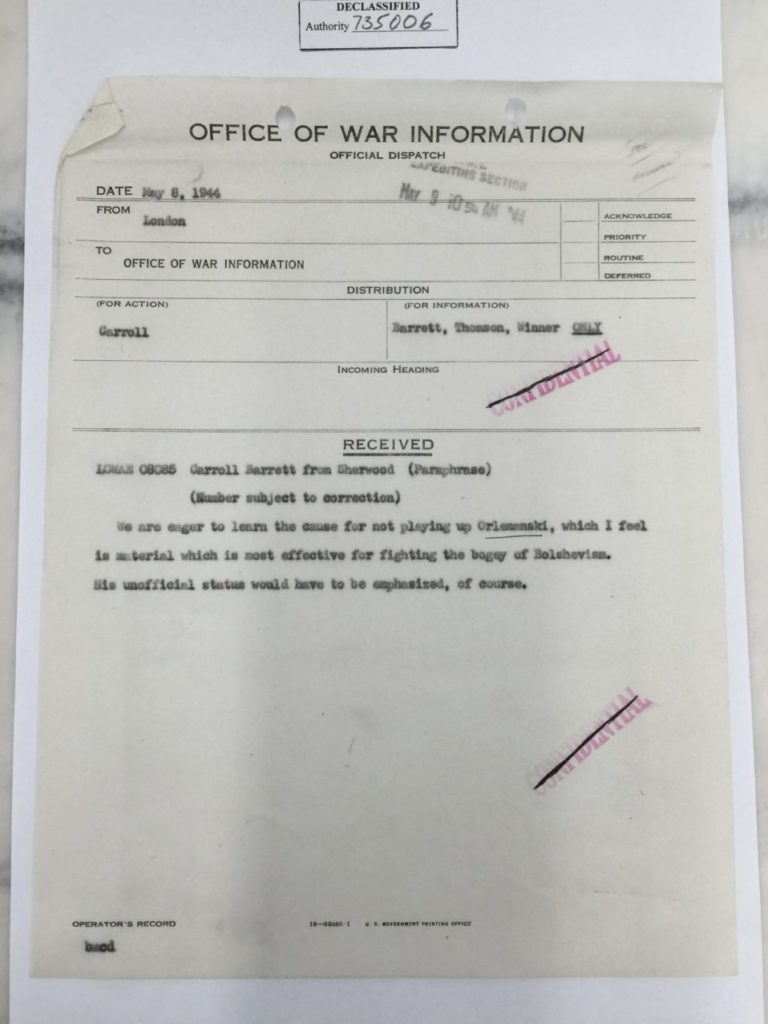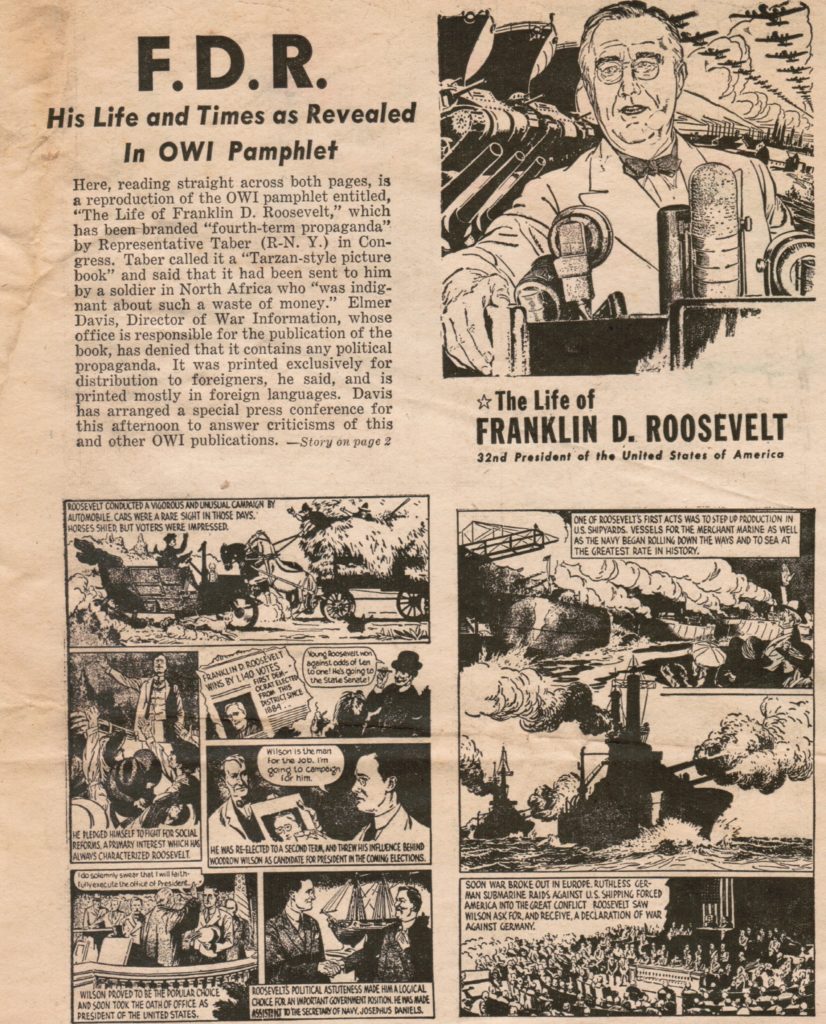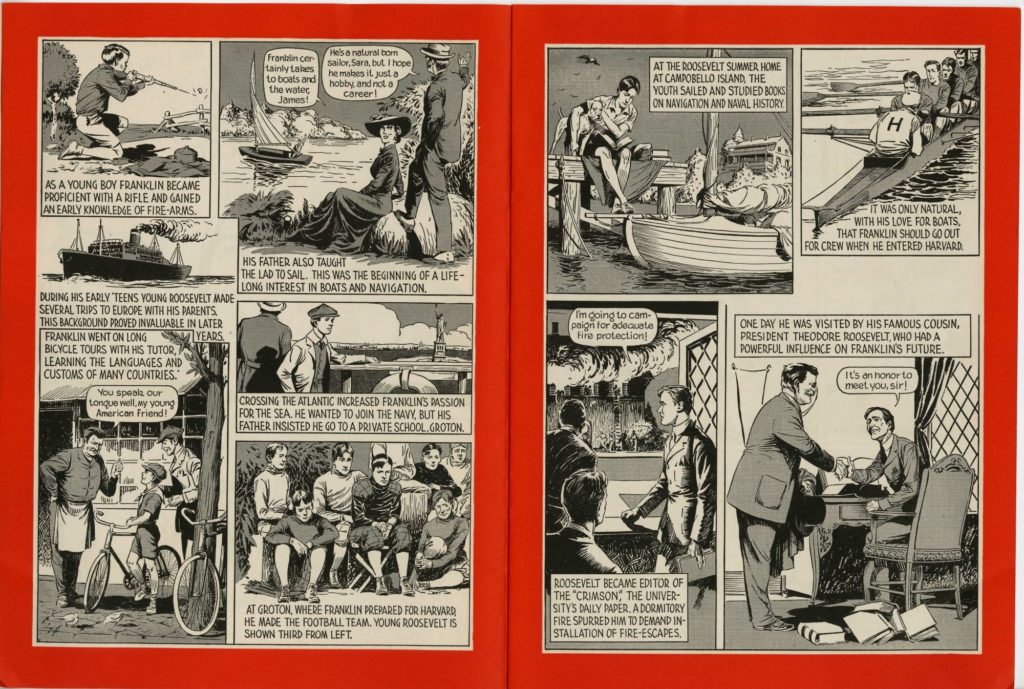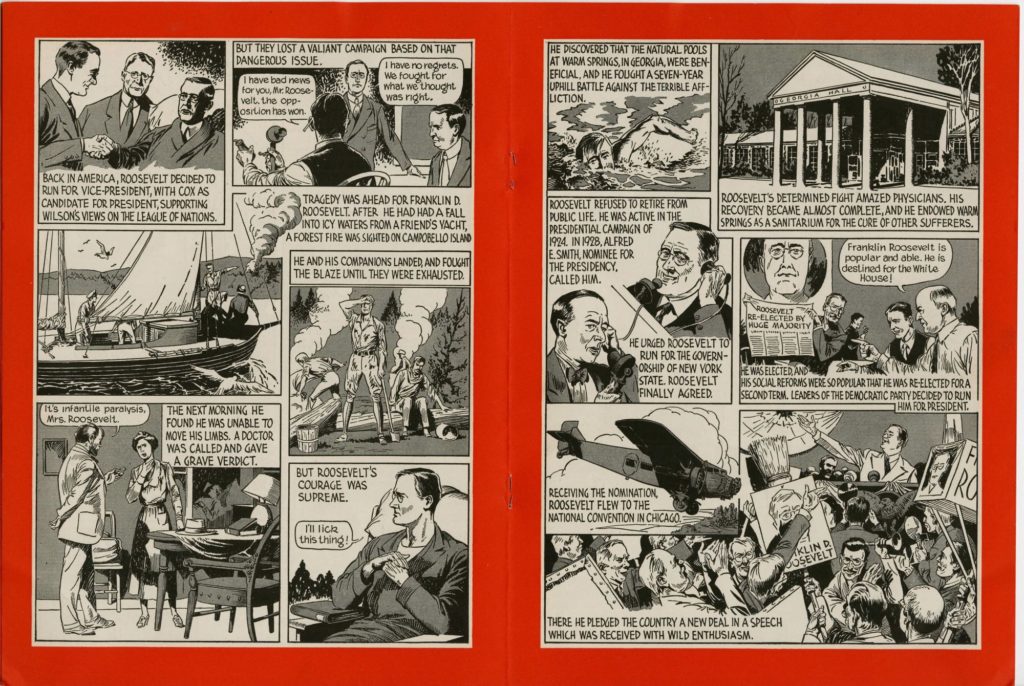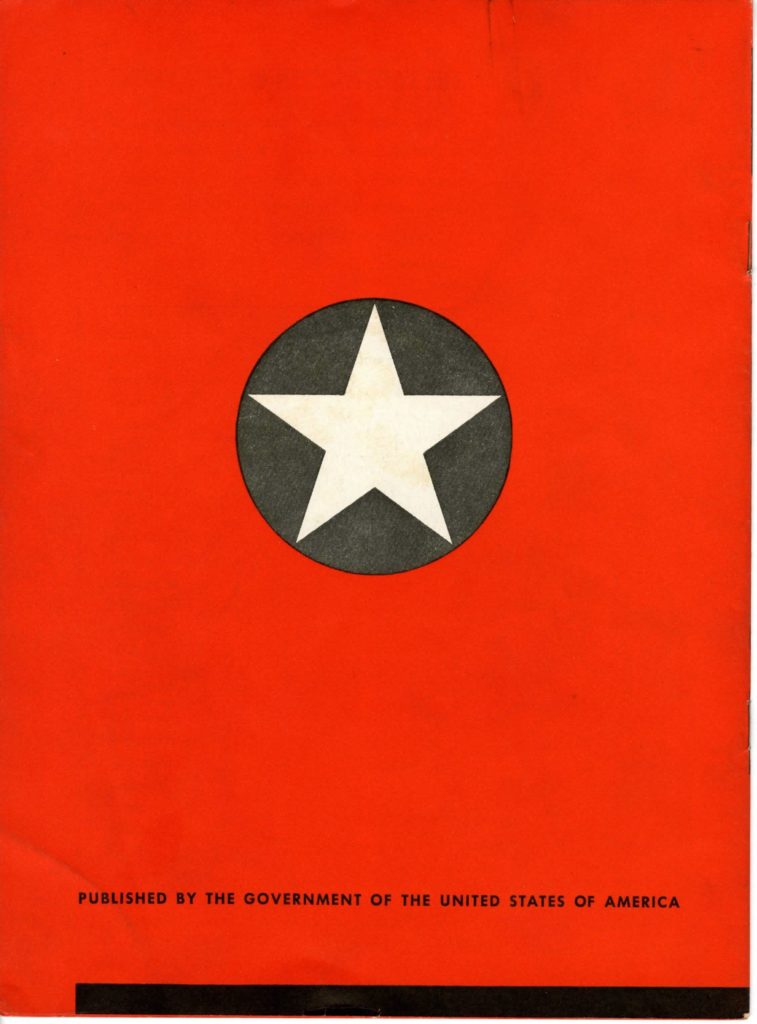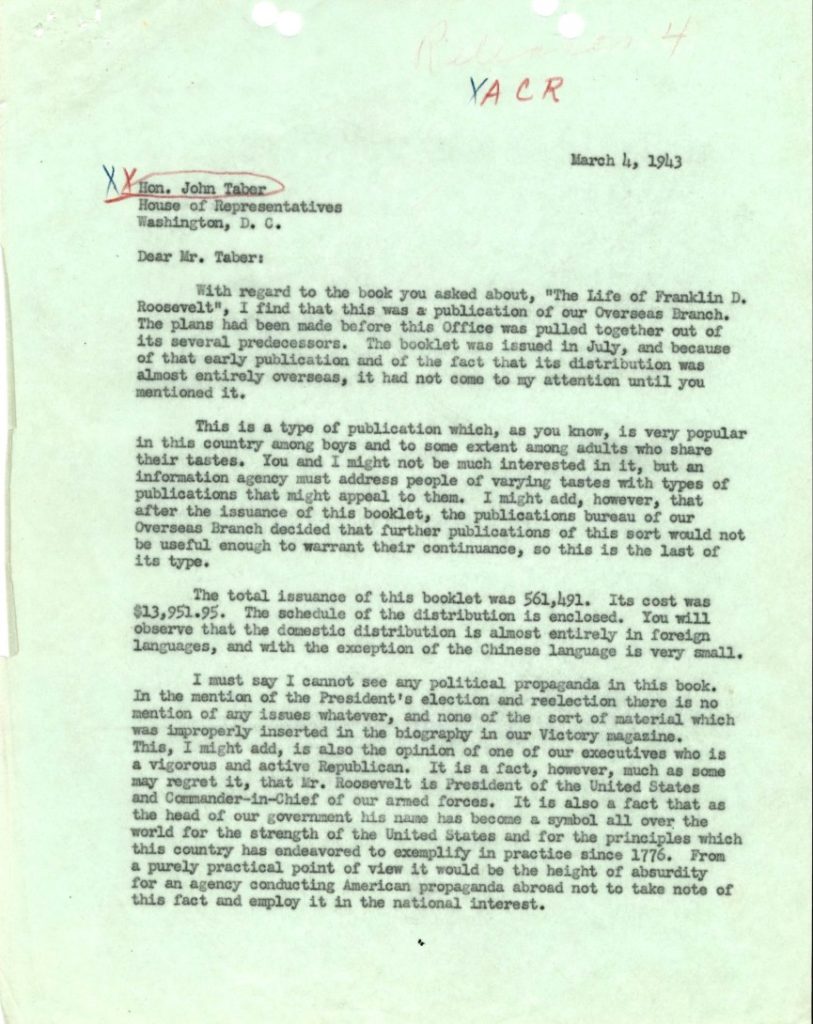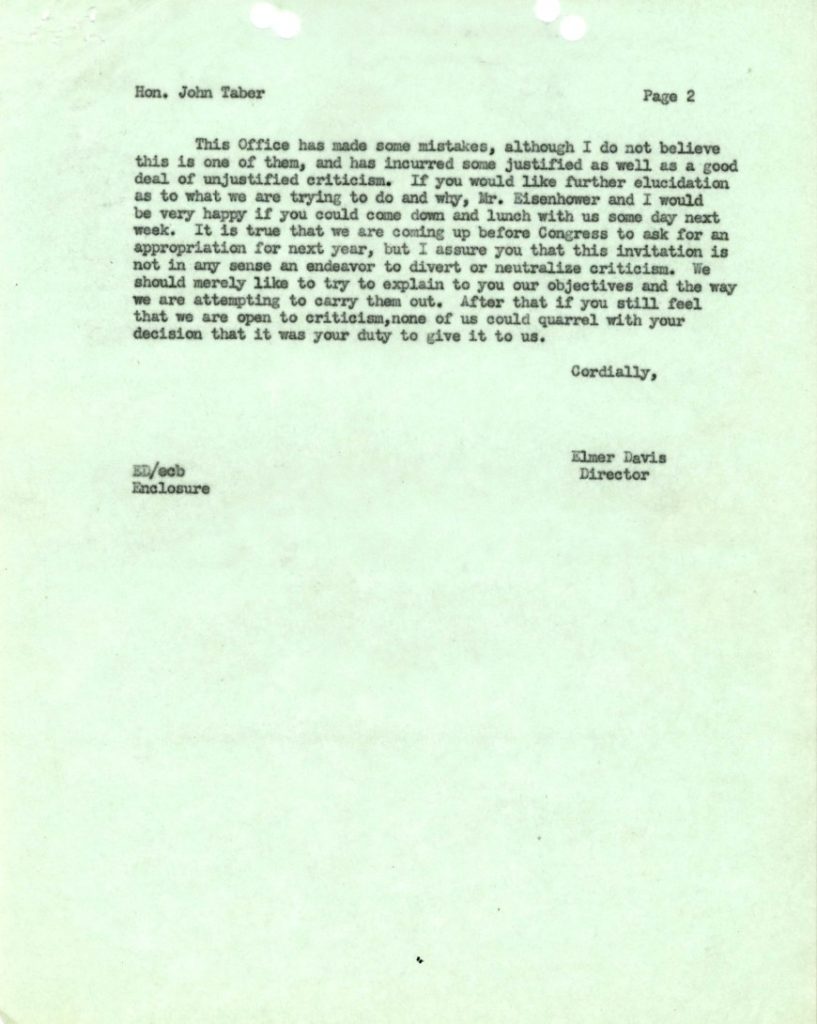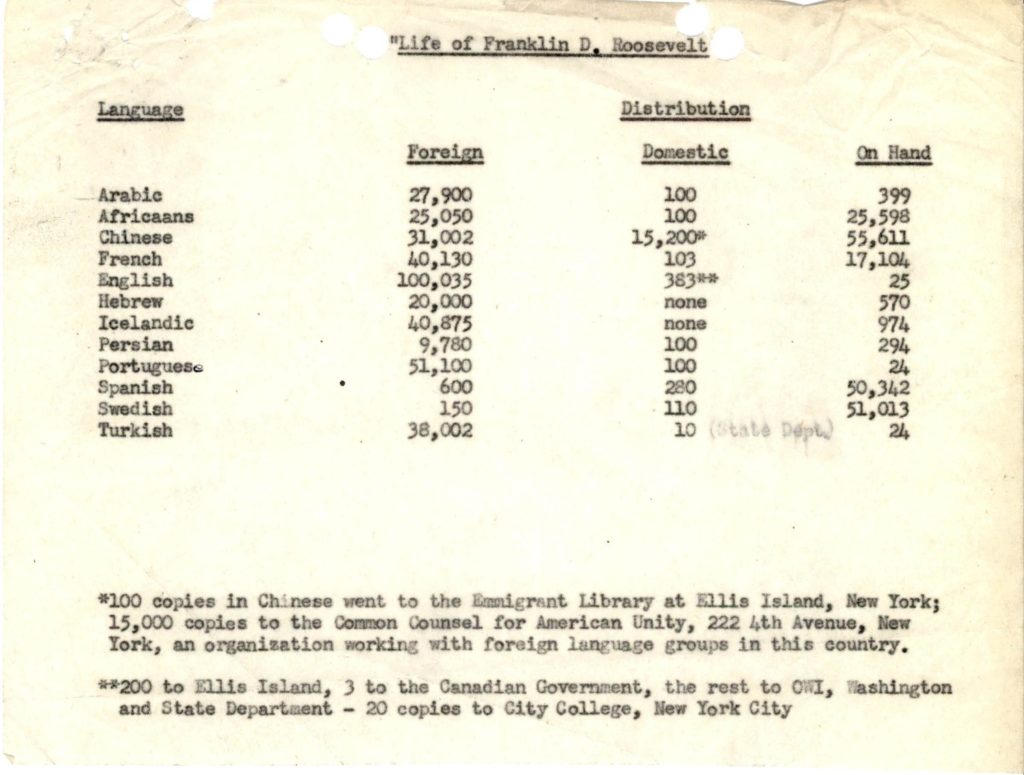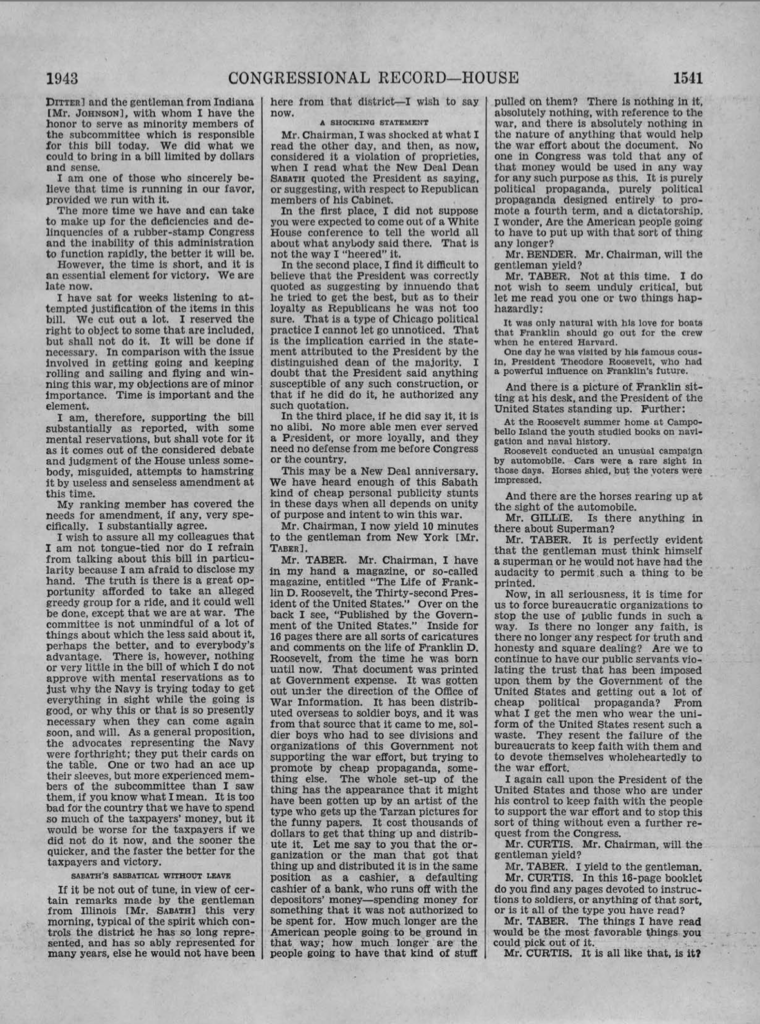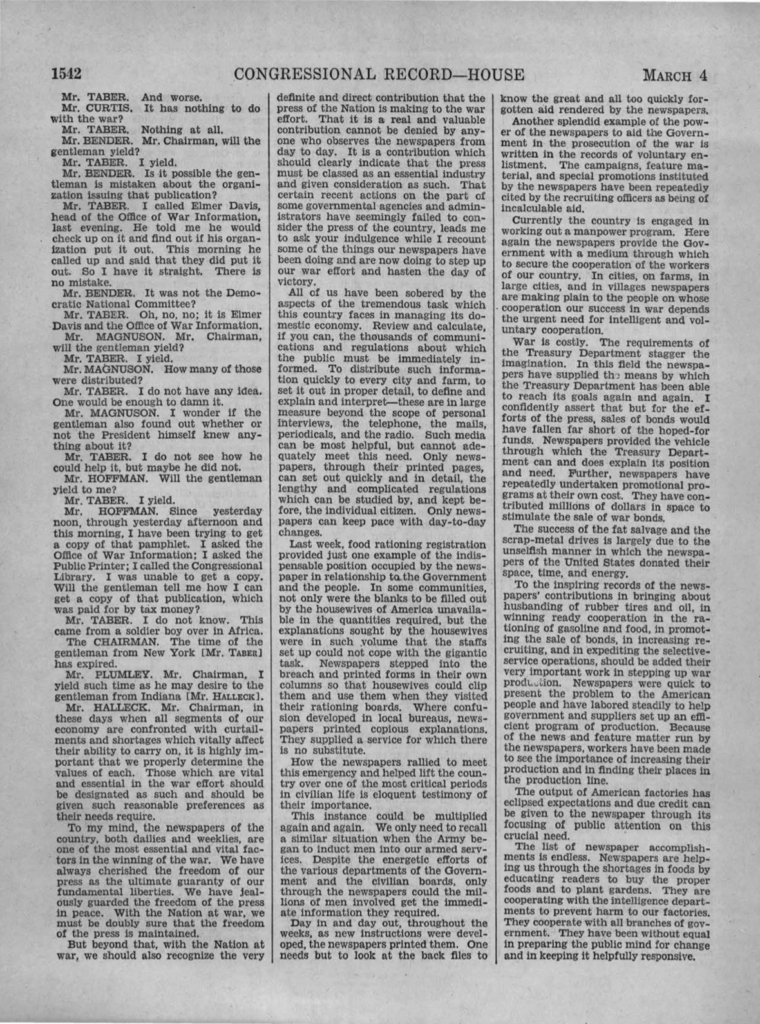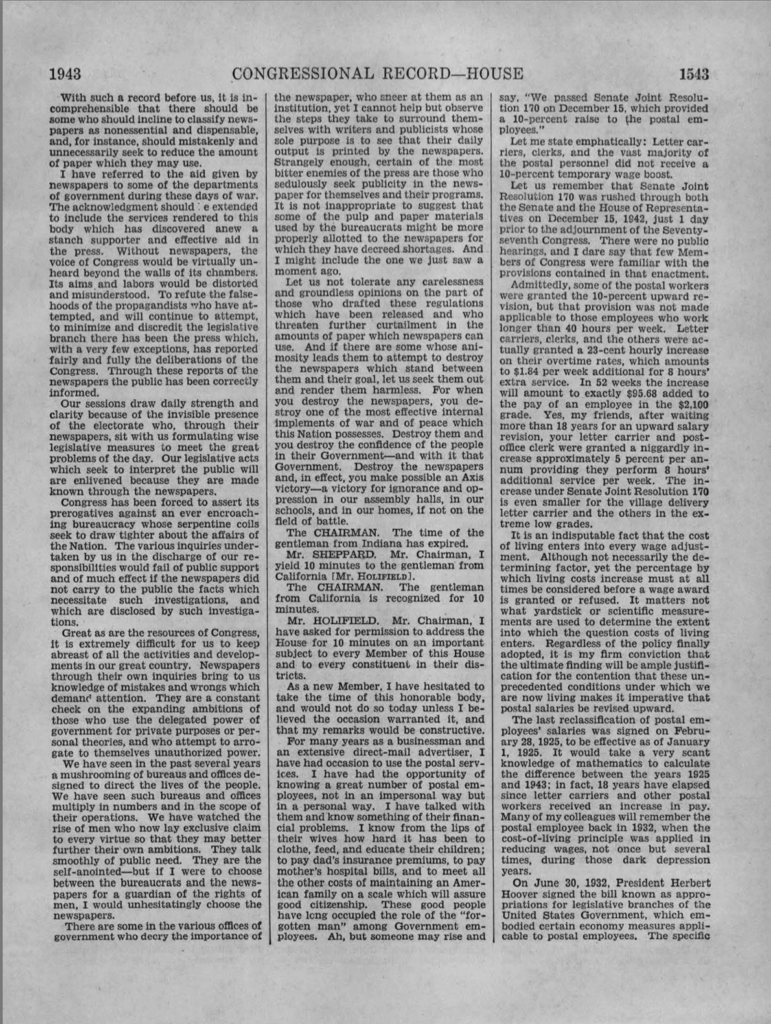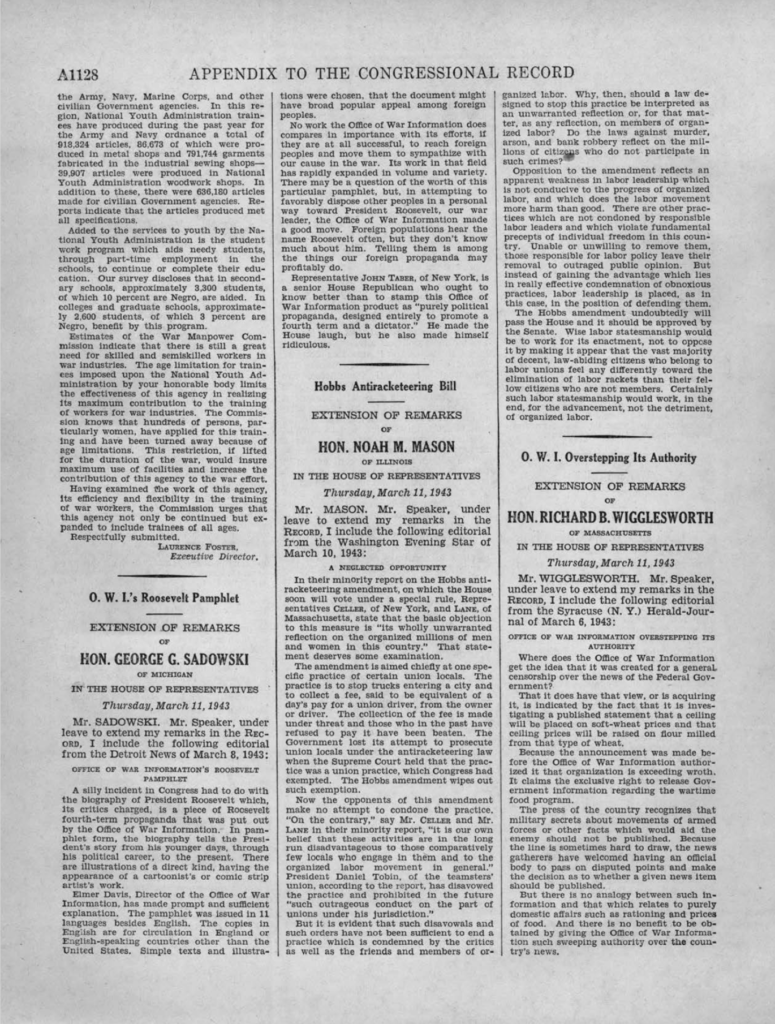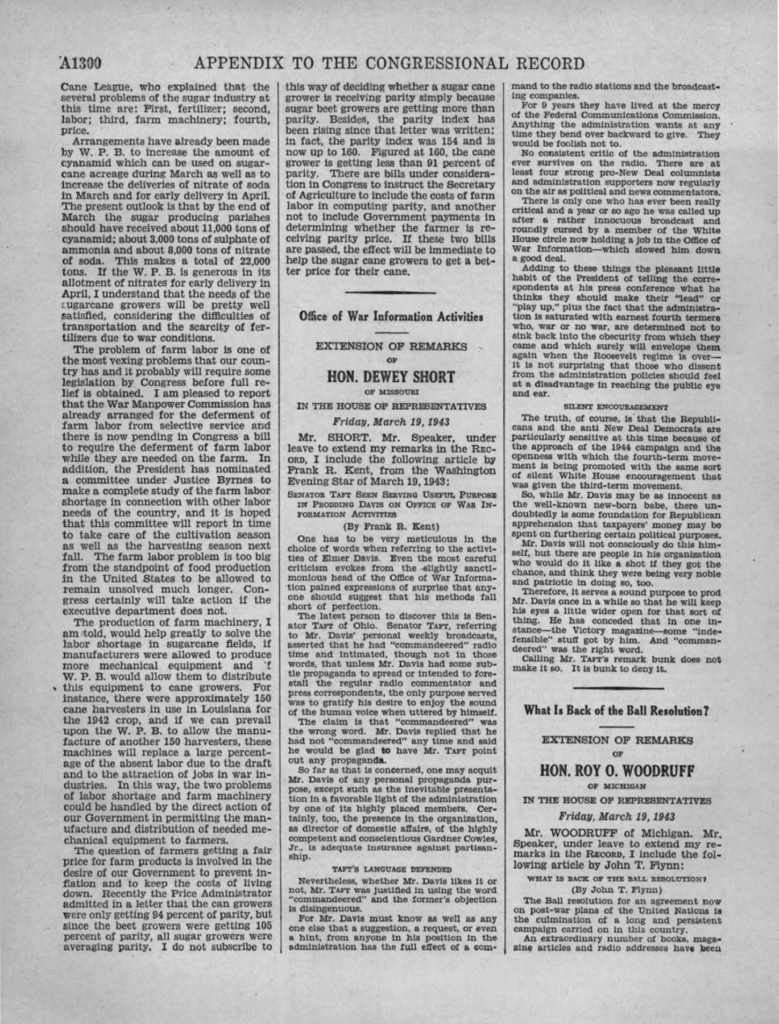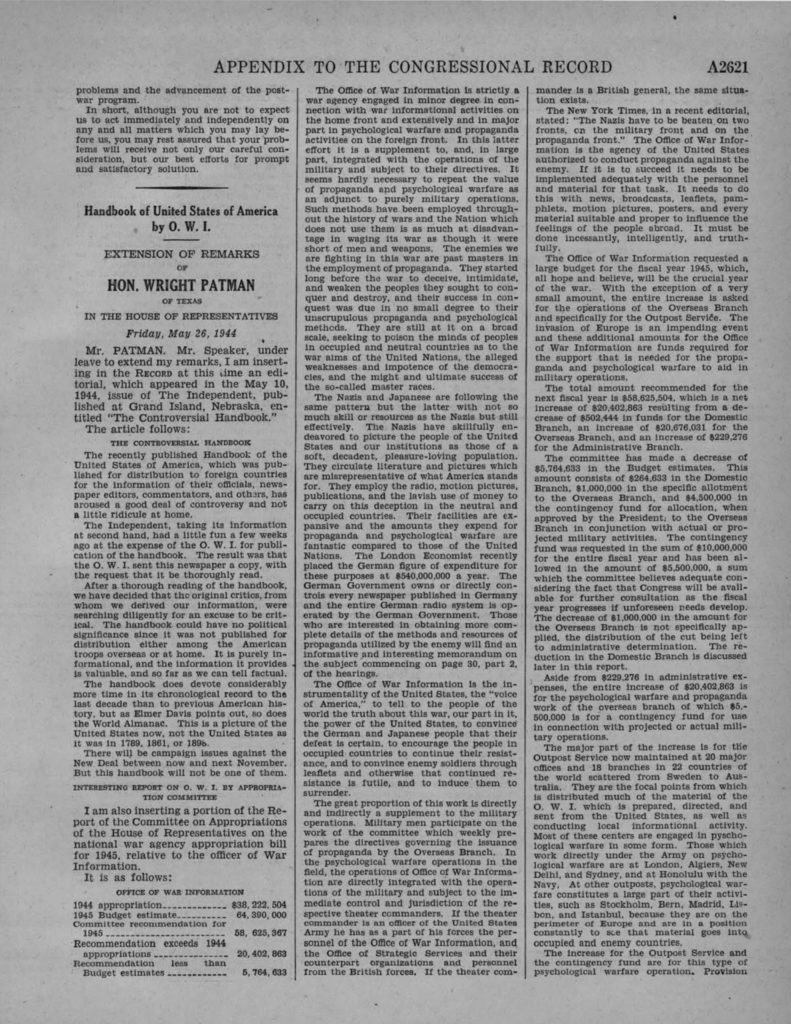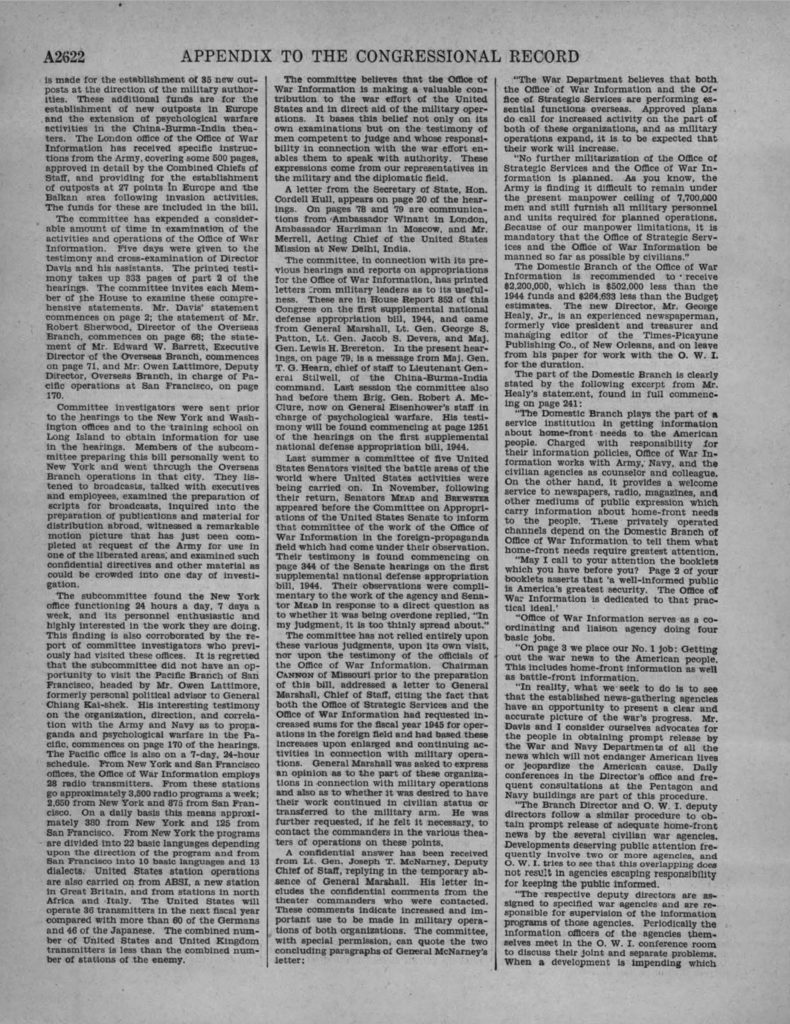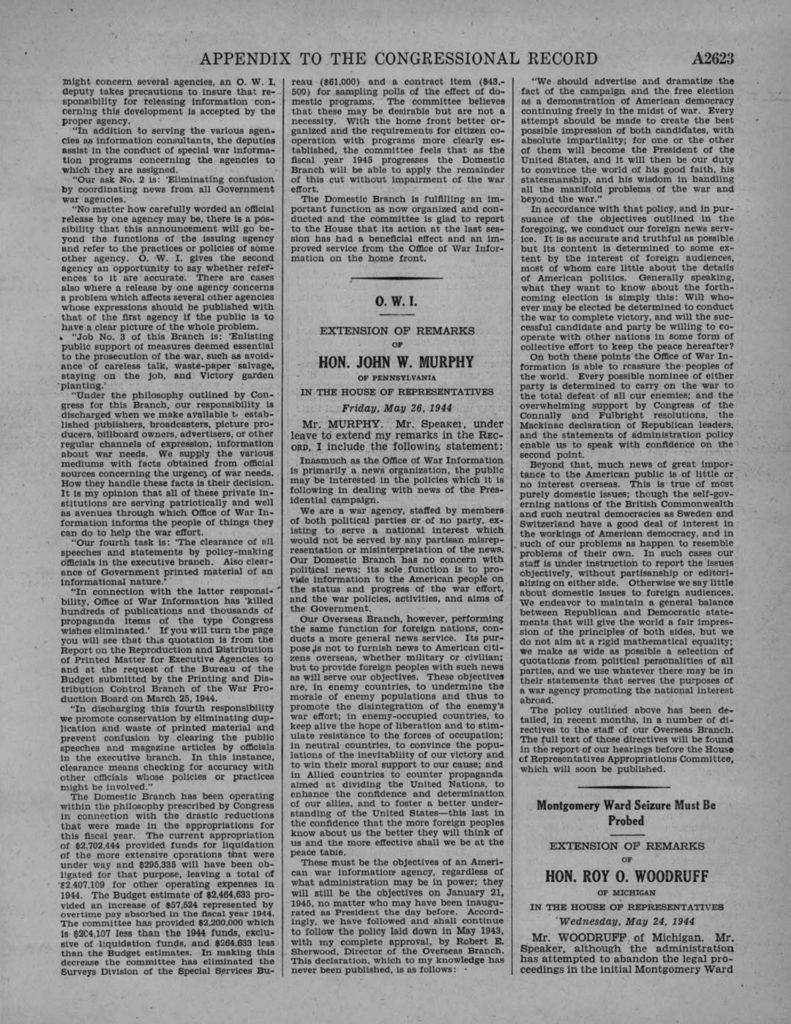How Congress Exposed, Defunded and Stopped Domestic U.S. Government Propaganda in 1943
During World War II, the federal government’s Office of War Information (OWI), where Voice of America (VOA) radio broadcasts for overseas audiences were started in 1942, produced news and factual war information, but it also produced mildly partisan and sometimes deceptive pro-Soviet propaganda for newspapers and radio in the United States until the U.S. Congress, responding to bipartisan concerns and protests, defunded such domestic propaganda activities by the Executive Branch during Franklin D. Roosevelt’s wartime presidency. Even during the war, there was bipartisan weariness about any U.S. administration propagandizing to Americans at taxpayers’ expense and concern about government-hired journalists advancing their own domestic partisan agenda or foreign interests. How the U.S. Congress handled these problems during World War II and immediately after the war may offer lessons for managing U.S.-funded international media outreach today and for protecting the Voice of America from partisan-driven journalism, either at the direction of the White House or by officials in charge of VOA, as well as by U.S. government-employed journalists themselves expressing their own partisan or ideological preferences at the expense of truth, objectivity, balance and the VOA Charter. These lessons could be applied to today’s taxpayer-funded Voice of America in its current U.S. federal government parent agency — the U.S. Agency for Global Media (USAGM) — both undergoing a leadership change amid accusations of past and potentially future partisan bias, and fears of foreign propaganda from China, Iran and Russia seeping into VOA’s current programs. In 1943, the U.S. Congress exposed and stopped most of the Executive Branch’s domestic propaganda activities by eliminating most of the funding for the government’s domestic media outreach while preserving funding for Voice of America’s overseas radio broadcasts. After the war, restrictions on domestic distribution of VOA programming were written into law and journalists hired by VOA were subjected to much stricter security background checks.
Much of OWI’s and VOA’s propaganda output in World War II radio programs and in print was anti-Nazi and anti-Japanese. U.S. government news and information broadcasts and press releases were in many cases truthful on major facts, but in some instances important material facts were omitted or distorted and opinions were selected and crafted to deceive foreign and domestic audiences. This usually happened when OWI and VOA officials and journalists felt that negative information about America’s all important military ally—the communist Soviet Union—needed to be censored and replaced with false claims of Stalin’s presumed support for democracy to protect the alliance against Hitler’s Germany and to advance U.S. war aims. They also tried, however, to promote their own radically Left-wing personal ideological agenda which favored Moscow and various communist parties, sometimes even against the wishes of the White House, the State Department and the Pentagon.
Pro-Soviet OWI and VOA journalists, among them VOA’s first chief news writer and editor Howard Fast who later joined the Communist Party USA, became an editor of the party’s newspaper The Daily Worker and in 1953 received the Stalin Peace Prize, repeated and promoted Soviet lies and disinformation, both in the United States and abroad. While some glorification of Stalin and lies were tolerated or even encouraged by the Roosevelt White House, in several instances VOA propagandists acted on their own. In a few incidents, their pro-Soviet and pro-communist zeal put at risk U.S. diplomacy and lives of American soldiers and resulted in a public rebuke from President Roosevelt, and long after the war from former President Dwight D. Eisenhower.
As pro-Soviet and communist propaganda became a matter of concern among some members of Congress, the Office of War Information also came under severe criticism for what many U.S. lawmakers, especially opposition Republicans, saw as misuse of taxpayers’ money to propagandize to Americans in favor of President Franklin Delano Roosevelt and the Democratic Party. Domestic partisan propaganda was not, however, a major feature in wartime Voice of America broadcasts. It was mild compared to what can be seen in today’s U.S. media, including some of VOA’s current program output. During World War II, OWI and VOA programmers produced materials that could be viewed as overly supportive of Franklin Delano Roosevelt’s presidency, but they did not openly attack his domestic political rivals among Republicans. Their subtle partisan propaganda, however, still triggered a strong and effective pushback in the U.S. Congress.
Republicans and some conservative Democrats feared that if domestic U.S. government propaganda from the Executive Branch during the war were not challenged and stopped, it could eventually become a threat to American democracy. Members of Congress from both parties, especially whose districts had large numbers of immigrants from East-Central Europe, were also concerned about pro-Soviet influence in Voice of America wartime broadcasts. At the same time, a few Democratic members of Congress who had a naively favorable view of communism and Soviet dictator Josef Stalin, defended OWI and VOA officials and journalists.
Congressional defenders of the wartime U.S. propaganda agency were only partially successful in protecting its budget. In 1943, the U.S. Congress cut practically all funding for OWI’s domestic propaganda activities and even came close to de-funding Voice of America overseas broadcasts. Republicans were not the only ones complaining about Soviet and communist influence at the Office of War Information and the Voice of America. Liberal Democrats and friends of President Roosevelt in the State Department put pressure on the White House and the agency to get rid of VOA’s first director, John Houseman, who was responsible for hiring many of his pro-Soviet communist friends and associates to work on producing VOA broadcasts. He was forced to resign under pressure in mid-1943, but many of his hires as well as other pro-Soviet officials continued working for the agency for the remainder of the war, and in some cases even until the late 1940s.
While domestic partisan propaganda by the U.S. government was largely stopped, pro-Soviet propaganda continued in VOA programs for several more years. After the war, VOA changed from broadcasting Soviet propaganda lies to generally avoiding criticism of the Soviet Union until more pressure from Congress and the passage of the 1948 Smith-Mundt Act, which called for much stricter security checks on all Voice of America and State Department employees, eventually led to programming changes and more reporting on Soviet and other communist human rights violations. The 1948 Smith-Mundt Act also prohibited the Voice of America from distributing its programs in the United States in order to minimize the danger of U.S. government-funded and managed information programs becoming a vehicle for influencing American voters.
Some of these 1948 Smith-Mundt Act restrictions on domestic distribution of VOA programs were lifted in 2013 by the Smith-Mundt Modernization Act, which was introduced in 2010 by Congressman Adam Smith (D-WA) and Congressman Mac Thornberry (R-TX), made part of a larger piece of legislation in 2012, and went into effect on July 2, 2013. However, by that time most VOA programs were already easily accessible to Americans on the Internet. The Voice of America is now still prohibited by U.S. law from actively marketing its programs to American media and directly to Americans, but some of it happens automatically, especially through social media.
The Voice of America currently placed in the U.S. Agency for Global Media (USAGM), previously known as the Broadcasting Board of Governors (BBG), has engaged in unprecedented levels of domestic propaganda during the 2016 U.S. presidential campaign. Had the Voice of America done something like this during World War II, it could have risked being immediately shut down by both Republicans and Democrats in Congress. Compared to today’s programs from the Voice of America, which also include repetition of unchallenged propaganda from China, Iran and Russia, U.S. government’s domestic propaganda in 1943 may seem minor, but during World War II it received a lot of attention from members of Congress. Wartime domestic Executive Branch propaganda programs were quickly de-funded while pro-Soviet propaganda in Voice of America broadcasts was frequently exposed and criticized by U.S. lawmakers until it was largely eliminated in the late 1940s and early 1950s.
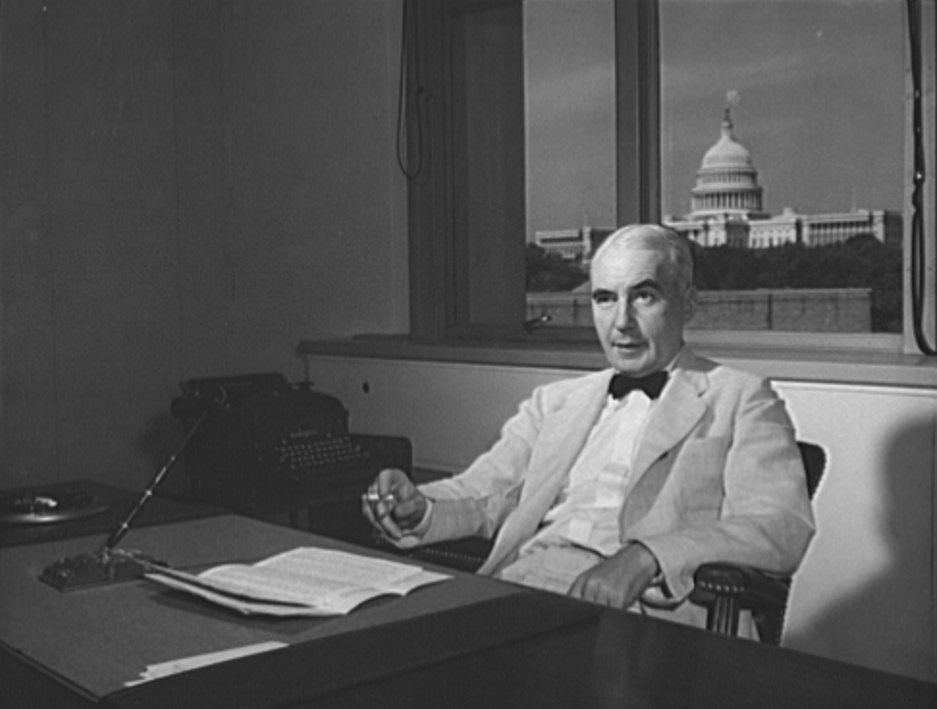
During World War II, American newspapers sometimes reprinted Office of War Information press releases and propaganda materials and radio networks carried commentaries by OWI director Elmer Davis which were also broadcast abroad by the Voice of America, thus giving them both domestic and foreign distribution. In April and May 1943, Davis, who was a newspaper and radio journalist, introduced Americans to one of the greatest Soviet propaganda lies when he repeated and promoted Stalin’s false claims that the Soviets were not responsible for the mass execution murder of thousands of Polish POW military officers in the so-called Katyn Forest massacre. He told members of Congress after the war that he was convinced earlier of the truthfulness of the Soviet claims.
President Roosevelt chose Davis to be the first, and as it turned out, the only Office of War Information director because he appreciated his ability to influence American public opinion as a popular radio broadcaster and journalist. In November 1942, FDR urged Davis to resume his domestic radio broadcasts while occupying his government position in charge of war information and propaganda.
THE WHITE HOUSE
MEMORANDUM FOR HONORABLE ELMER DAVIS
November 20, 1942
Here is another one who seeks your voice [in the United States].
F.D.R.
Enclosure
Transmitting memorandum which the President
received from Honorable Harry L. Hopkins under date of
11/19/42, regarding – “What would you think
of Elmer Davis giving a weekly summary of the
war news over the air? I think the public have
confidence in Davis. He has an excellent radio
voice. It is possible we could get all stations
in the United States to carry it. He would
make the news interesting.”
When confronted with accusations from members of Congress of conducting domestic partisan propaganda, Davis gave misleading explanations. In the case of a pro-Roosevelt pamphlet published by OWI in 1943, he said that it did not contain any political propaganda, although the pamphlet clearly did, and that it was produced exclusively for distribution to foreigners although a large portion of the printing was in English and the pamphlets were distributed to American soldiers overseas. He also failed to mention that American newspapers often reprinted such OWI material in English and in foreign languages. While he may have not lied outright, his statements were deceptive.

Davis’ deputy American playwright and President Roosevelt’s speechwriter Robert E. Sherwood, sometimes referred to as the founding father of the Voice of America, was a highly partisan but brilliant individual who held strong liberal opinions and was an enthusiastic supporter of close cooperation between Voice of America and Soviet propagandists during World War II. In 1944, Sherwood who had ongoing battle with Davis, was sent to Great Britain to coordinate American propaganda with Soviet Embassy officials in London. From there, he continued to issue propaganda directives to VOA and included in them some of the Soviet propaganda instructions he tried hard to obtain in meetings with Soviet diplomats who were in fact Soviet KGB spies. When a radical Polish-American Catholic priest Stanislaus Orlemanski was duped by KGB to agree to travel to Moscow to meet with Stalin, Sherwood argued strongly for giving his trip maximum publicity in VOA broadcasts and other OWI programs to prove that the Soviet leader supported religious freedom.
When others in the Roosevelt administration apparently decided that for reasons of preserving the support of Polish-American voters for President Roosevelt and the Democratic Party in the 1944 U.S. elections it would be wiser not to give official U.S. government publicity to Orlemanski-Stalin meeting, Sherwood send a confidential cable from London expressing his dismay and suggesting that publicizing the Polish-American priest’s meeting with Stalin could help fight the fear of communism among Americans. “We are eager to learn the cause for not playing up Orlemenski [sic], which I feel is material most effective for fighting the bogey of Bolshevism. His unofficial status would have to be emphasized, of course,” Sherwood wrote to the Office of War Information in a secret cable from London.
But while he supported Soviet foreign policy goals, which he believed to be in America’s interest, Robert Sherwood was also politically savvy to understand that in order to push his ideological agenda, he had to at least pretend that the Voice of America was above domestic politics and remained nonpartisan in its reporting on U.S. presidential elections.
A statement on U.S. election coverage presumably written by Sherwood was placed in The Congressional Record by John W. Murphy, a Democrat from Pennsylvania, on May 26, 1944. It is important to keep in mind that the wartime VOA was not exactly how Sherwood had described it in his statement. He was after all a great master of domestic and foreign public relations. But while contrary to official declarations, VOA employed many partisan individuals who engaged in pro-administration and pro-Soviet propaganda, some of his advice on how VOA should cover U.S. elections remains as valid today as it was then.
It’s quite clear that Robert E. Sherwood was above all a propagandist when he says that “[e]very attempt should be made to create the best possible impression of both candidates.” That certainly should not be VOA’s role, but the rest of his statement is worth paying attention to. His directives are preceded by another statement, which is not clearly attributed. It may have been delivered by the Office of War Information Director Elmer Davis and repeated by Congressman John W. Murphy.
STATEMENT POSSIBLY ORIGINATED BY AN OWI OFFICIAL:
“Inasmuch as the Office of War Information is primarily a news organization, the public may be interested in the policies which it is following in dealing with news of the Presidential campaign.”
“We are a war agency, staffed by members of both political parties or of no party, existing to serve a national interest which would not be served by any partisan misrepresentation or misinterpretation of the news.”
(…)
“These must be the objectives of an American war information agency, regardless of what administration may be in power; they will still be the objectives on January 21, 1945, no matter who may have been inaugurated as President the day before. Accordingly, we have followed and shall continue to follow the policy laid down in May 1943, with, my complete approval, by Robert E. Sherwood, Director of the Overseas Branch [which included Voice of America]. This declaration, which to my knowledge has never been published, is as follows:”
STATEMENT ATTRIBUTED TO ROBERT E. SHERWOOD:
“We should advertise and dramatize the fact of the campaign and the free election as a demonstration of American democracy is continuing freely in the midst of war. Every attempt should be made to create the best possible impression of both candidates, with absolute impartiality; for one or the other of them will become the President of the United States, and it will then be our duty to convince the world of his good faith, his statesmanship, and his wisdom in handling all the manifold problems of the war and beyond the war.”
“In accordance with that policy, and in pursuance of these objectives outlined in the foregoing, we conduct our foreign news service. It is as accurate and truthful as possible but its content is determined to some extent by the interest of foreign audiences, most of whom care little about the details of American politics. Generally speaking, what they want to know about the forthcoming election is simply this: Will whoever may be elected be determined to conduct the war to complete victory, and will the successful candidate and party be willing to cooperate with other nations in some form of collective effort to keep the peace hereafter?”
(…)
“Beyond that, much news of great importance to the American publics of little or no interest overseas. This is true of most purely domestic issues; though the self-governing nations of the British Commonwealth and such neutral democracies as Sweden and Switzerland have a good deal of interest in the workings of American democracy, and in such of our problems as happen to resemble problems of their own. In such cases our staff is under instruction to report the issues objectively, without partisanship or editorializing on either side. Otherwise we say little about domestic issues to foreign audiences.”
“We endeavor to maintain a general balance between Republican and Democratic statements that will give the world a fair impression of the principles of both sides, but we do not aim at a rigid mathematical equality; we make as wide as possible a selection of quotations from political personalities of all parties, and we use whatever there may be in their statements that serves the purposes of a war agency promoting the national interest abroad.”
Daily News, New York, March 6, 1943
Here, reading straight across both pages, is a reproduction of the OWI pamphlet entitled, “The Life of Franklin D. Roosevelt,” which has been branded “fourth-term propaganda” by Representative Taber (R-N. Y.) in Congress. Taber called it a “Tarzan-style picture book” and said that it had been sent to him by a soldier in North Africa who “was indig nant about such a waste of money.” Elmer Davis, Director of War Information, whose office is responsible for the publication of the book, has denied that it contains any political propaganda. It was printed exclusively for distribution to foreigners, he said, and is printed mostly in foreign languages. Davis has arranged a special press conference for this afternoon to answer criticisms of this and other OWI publications. — Story on page 2
Daily News, New York, March 6, 1943
For More Information Read: Propaganda, Politics, and the Personification of FDR: The Uncle Sam Poster Controversy. By Daniel Dancis, an Archivist in the Textual Processing Branch at the National Archives in College Park, MD. September 24, 2019.
March 4, 1943
Hon. John Tabor
House of Representatives
Washington, D.C.
Dear Mr. Taber:
With regard to the book you asked about, “The Life of Franklin D. Roosevelt”, I find that this was a publication of our Overseas Branch. The plans had been made before this Office was pulled together out of its several predecessors. The booklet was issued in July, and of that early publication and of the fact that its distribution was almost entirely overseas, it had not cone to ay attention until you mentioned it.
This is a type of publication which, as you know, is very popular in this country among boys and to some extent among adults who share their tastes. You and I might not be much interested in it, but an information agency must address people of varying tastes with types of publications that might appeal to them. I might add, however, that after the issuance of this booklet, the publicatione bureau of our Overseas Branch decided that further publications of this sort would not be useful to warrant their continuance, so this is the last of its type.
The total issuance of this was 561,491. Its cost was $13,951.95. The schedule of the distribution is enclosed. You will observe that the domestic distribution is almost entirely in foreign languages,and with the exception of the Chinese language is very small.
I must say I cannot see any political propaganda in this book, In the mention of the President’s election and reelection there is no mention of any issues whatever, and none of the sort of material which was improperly inserted in the biography in our Victory magazine. This, I might add, is also the opinion of one of our executives who is a vigorous and active Republican. It is a fact, however, much as some may regret it, that Mr. Roosevelt is President of the United States and Commander-in-Chief of our armed forces. It is also a fact that as the head of our government his name has become a symbol all over the world for the strength of the United States and for the principles which this country has endeavored to exemplify since 1776. From a purely practical point of view it would be the height of absurdity for an agency conducting American propaganda abroad not to take note of this fact and employ it in the national interest.
Hon. John Taber
Page 2
This Office has made some mistakes, although I do not believe this is one of them, and has incurred some justified, as well as a good deal of unjustified criticism. If you would like further elucidation as to what we are trying to do and why, Mr. [Milton] Eisenhower and I would be very happy if you could come down and lunch with us some day next week. It is true that we are coming up before Congress to ask for an appropriation for next year, but I assure you that this invitation is not in any sense an endeavor to divert or neutralize criticism. We should like to try to explain to you our objectives and the way we are attempting to carry them out. After that if you still feel that we are open to criticism, none of us could quarrel with your decision that it was your duty to give it to us.
Cordially,
Elmer Davis
Director
ED/ecb
Enclosure
Mr. Chairman, I now yield 10 minutes to the gentleman from New York [Mr. Taber].
Mr. TABER. Mr. Chairman, I have In my hand a magazine, or so-called magazine, entitled “The Life of Frank lin D. Roosevelt, the Thirty-second President of the United States.” Over on the back I see, “Published by the Government of the United States.” Inside for 16 pages there are all sorts of caricatures and comments on the life of Franklin D. Roosevelt, from the time he was born until now. That document was printed at Government expense. It was gotten out under the direction of the Office of War Information. It has been distributed overseas to soldier boys, and it was from that source that it came to me, soldier boys who had to see divisions and organizations of this Government not supporting the war effort, but trying to promote by cheap propaganda, something else. The whole set-up of the thing has the appearance that it might have been gotten up by an artist of the type who gets up the Tarzan pictures for the funny papers. It cost thousands of dollars to get that thing up and distribute it. Let me say to you that the organization or the man that got that thing up and distributed it is in the same position as a cashier, a defaulting cashier of a bank, who runs off with the depositors’ money—spending money for something that it was not authorized to be spent for. How much longer are the American people going to be ground in that way; how much longer are the people going to have that kind of stuff pulled on them? There is nothing in it, absolutely nothing, with reference to the war, and there is absolutely nothing in the nature of anything that would help the war effort about the document. No one in Congress was told that any of that money would be used in any way for any such purpose as this. It is purely political propaganda, purely political propaganda designed entirely to promote a fourth term, and a dictatorship. I wonder, Are the American people going to have to put up with that sort of thing any longer?
Mr. BENDER. Mr. Chairman, will the gentleman yield?
Mr. TABER. Not at this time. I do not wish to seem unduly critical, but let me read you one or two things haphazardly :
It was only natural with his love for boats that Franklin should go out for the crew when he entered Harvard.
One day he was visited by his famous cousin, President Theodore Roosevelt, who had a powerful influence on Franklin’s future.
And there is a picture of Franklin sitting at his desk, and the President of the United States standing up. Further:
At the Roosevelt summer home at Campobello Island the youth studied books on navigation and naval history.
Roosevelt conducted an unusual campaign by automobile. Cars were a rare sight in those days. Horses shied, but the voters were
impressed.
And there are the horses rearing up at the sight of the automobile.
Mr. GILLIE. Is there anything in there about Superman?
Mr. TABER. It is perfectly evident that the gentleman must think himself a superman or he would not have had the audacity to permit such a thing to be printed.
Now, in all seriousness, it is time for us to force bureaucratic organizations to stop the use of public funds in such a way. Is there no longer any faith, is there no longer any respect for truth and honesty and square dealing? Are we to continue to have our public servants violating the trust that has been imposed upon them by the Government of the United States and getting out a lot of cheap political propaganda? From what I get the men who wear the uniform of the United States resent such a waste. They resent the failure of the bureaucrats to keep faith with them and to devote themselves wholeheartedly to the war effort.
I again call upon the President of the United States and those who are under his control to keep faith with the people to support the war effort and to stop this sort of thing without even a further request from the Congress.
Mr. CURTIS. Mr. Chairman, will the gentleman yield?
Mr. TABER. I yield to the gentleman.
Mr. CURTIS. In this 16-page booklet do you find any pages devoted to instruc tions to soldiers, or anything of that sort, or is it all of the type you have read?
Mr. TABER. The things I have read would be the most favorable things you could pick out of it.
Mr. CURTIS. It is all like that, is it?
Mr. TABER. And worse.
Mr. CURTIS. It has nothing to do with the war?
Mr. TABER. Nothing at all.
Mr. BENDER. Mr. Chairman, will the gentleman yield?
Mr. TABER. I yield.
Mr. BENDER. Is it possible the gentleman is mistaken about the organization issuing that publication?
Mr. TABER. I called Elmer Davis, head of the Office of War Information, last evening. He told me he would check up on it and find out if his organization put it out. This morning he called up and said that they did put it out. So I have it straight. There is no mistake.
Mr. BENDER. It was not the Democratic National Committee?
Mr. TABER. Oh, no. no; it is Elmer Davis and the Office of War Information.
Mr. MAGNUSON. Mr. Chairman, will the gentleman yield?
Mr. TABER. I yield.
Mr. MAGNUSON. How many of those were distributed?
Mr. TABER. I do not have any idea. One would be enough to damn it.
Mr. MAGNUSON. I wonder if the gentleman also found out whether or not the President himself knew anything about it?
Mr. TABER. I do not see how he could help it, but maybe he did not.
Mr. HOFFMAN. Will the gentleman yield to me?
Mr. TABER. I yield.
Mr. HOFFMAN. Since yesterday noon, through yesterday afternoon and this morning, I have been trying to get a copy of that pamphlet. I asked the Office of War Information; I asked the Public Printer; I called the Congressional Library. I was unable to get a copy. Will the gentleman tell me how I can get a copy of that publication, which was paid for by tax money?
Mr. TABER. I do not know. This came from a soldier boy over in Africa. The
CHAIRMAN. The time of the gentleman from New York [Mr. Taber]
has expired.
Mr. PLUMLEY. Mr. Chairman, I yield such time as he may desire to the gentleman from Indiana [Mr. Halleck]
Mr. HALLECK. Mr. Chairman, in these days when all segments of our economy are confronted with curtailments and shortages which vitally affect their ability to carry on, it is highly important that we properly determine the values of each. Those which are vital and essential in the war effort should be designated as such and should be given such reasonable preferences as their needs require.
To my mind, the newspapers of the country, both dailies and weeklies, are one of the most essential and vital factors in the winning of the war. We have always cherished the freedom of our press as the ultimate guaranty of our fundamental liberties. We have jealously guarded the freedom of the press in peace. With the Nation at war, we must be doubly sure that the freedom of the press is maintained.
But beyond that, with the Nation at war, we should also recognize the very definite and direct contribution that the press of the Nation is making to the war effort. That it is a real and valuable contribution cannot be denied by anyone who observes the newspapers from day to day. It is a contribution which should clearly indicate that the press must be classed as an essential industry and given consideration as such. That certain recent actions on the part of some governmental agencies and administrators have seemingly failed to consider the press of the country, leads me to ask your indulgence while I recount some of the things our newspapers have been doing and are now doing to step up our war effort and hasten the day of victory.
All of us have been sobered by the aspects of the tremendous task which this country faces in managing its domestic economy. Review and calculate, if you can, the thousands of communications and regulations about which the public must be immediately in formed. To distribute such information quickly to every city and farm, to set it out in proper detail, to define and
explain and interpret—these are in large measure beyond the scope of personal interviews, the telephone, the mails, periodicals, and the radio. Such media can be most helpful, but cannot adequately meet this need. Only newspapers, through their printed pages, can set out quickly and in detail, the lengthy and complicated regulations which can be studied by, and kept be fore, the individual citizen. Only newspapers can keep pace with day-to-day changes.
Last week, food rationing registration provided just one example of the indispensable position occupied by the newspaper in relationship to the Government and the people. In some communities, not only were the blanks to be filled out by the housewives of America unavailable in the quantities required, but the explanations sought by the housewives
were in such volume that the staffs set up could not cope with the gigantic
task. Newspapers stepped into the breach and printed forms in their own columns so that housewives could clip them and use them when they visited their rationing boards. Where confusion developed in local bureaus, news papers printed copious explanations. They supplied a service for which there is no substitute.
How the newspapers rallied to meet this emergency and helped lift the coun try over one of the most critical periods in civilian life is eloquent testimony of their importance.
This instance could be multiplied again and again. We only need to recall a similar situation when the Army began to induct men into our armed services. Despite the energetic efforts of the various departments of the Government and the civilian boards, only through the newspapers could the millions of men involved get the immediate information they required.
Day in and day out, throughout the weeks, as new instructions were devel oped, the newspapers printed them. One needs but to look at the back files to know the great and all too quickly for gotten aid rendered by the newspapers.
Another splendid example of the power of the newspapers to aid the Government in the prosecution of the war is written in the records of voluntary enlistment. The campaigns, feature material, and special promotions instituted by the newspapers have been repeatedly cited by the recruiting officers as being of incalculable aid.
Currently the country is engaged in working out a manpower program. Here again the newspapers provide the Government with a medium through which to secure the cooperation of the workers of our country. In cities, on farms, in large cities, and in villages newspapers are making plain to the people on whose cooperation our success in war depends the urgent need for intelligent and voluntary cooperation.
War is costly. The requirements of the Treasury Department stagger the imagination. In this field the newspa pers have supplied th: means by which the Treasury Department has been able to reach its goals again and again. I confidently assert that but for the efforts of the press, sales of bonds would have fallen far short of the hoped-for funds. Newspapers provided the vehicle through which the Treasury Depart ment can and does explain its position and need. Further, newspapers have repeatedly undertaken promotional pro grams at their own cost. They have contributed millions of dollars in space to stimulate the sale of war bonds.
The success of the fat salvage and the scrap-metal drives is largely due to the unselfish manner in which the newspapers of the United States donated their space, time, and energy.
To the inspiring records of the news papers’ contributions in bringing about husbanding of rubber tires and oil, in winning ready cooperation in the ra tioning of gasoline and food, in promot ing the sale of bonds, in increasing re cruiting, and in expediting the selective service operations, should be added their very important work in stepping up war production.
Newspapers were quick to present the problem to the American people and have labored steadily to help government and suppliers set up an efficient program of production. Because of the news and feature matter run by the newspapers, workers have been made to see the importance of increasing their production and in finding their places in the production line.
The output of American factories has eclipsed expectations and due credit can be given to the newspaper through its focusing of public attention on this crucial need.
The list of newspaper accomplishments is endless. Newspapers are helping us through the shortages in foods by educating readers to buy the proper foods and to plant gardens. They are cooperating with the intelligence departments to prevent harm to our factories. They cooperate with all branches of government. They have been without equal in preparing the public mind for change and in keeping it helpfully responsive.
With such a record before us. it is in comprehensible that there should be some who should incline to classify news papers as nonessential and dispensable, and, for instance, should mistakenly and unnecessarily seek to reduce the amount of paper which they may use.
I have referred to the aid given by newspapers to some of the departments of government during these days of war. The acknowledgment should be extended to include the services rendered to this body which has discovered anew a stanch supporter and effective aid in the press. Without newspapers, the voice of Congress would be virtually unheard beyond the walls of its chambers. Its alms and labors would be distorted and misunderstood. To refute the false hoods of the propagandists who have at tempted. and will continue to attempt, to minimize and discredit the legislative branch there has been the press which, with a very few exceptions, has reported fairly and fully the deliberations of the Congress. Through these reports of the newspapers the public has been correctly informed.
Our sessions draw daily strength and clarity because of the invisible presence of the electorate who, through their newspapers, sit with us formulating wise legislative measures to meet the great problems of the day. Our legislative acts which seek to interpret the public will are enlivened because they are made known through the newspapers. Congress has been forced to assert its prerogatives against an ever encroaching bureaucracy whose serpentine coils seek to draw tighter about the affairs of the Nation. The various inquiries under taken by us in the discharge of our re sponsibilities would fail of public support and of much effect if the newspapers did not carry to the public the facts which necessitate such investigations, and which are disclosed by such investigations.
Great as are the resources of Congress, it Is extremely difficult for us to keep abreast of all the activities and develop ments in our great country. Newspapers through their own inquiries bring to us knowledge of mistakes and wrongs which demand attention. They are a constant check on the expanding ambitions of those who use the delegated power of government for private purposes or personal theories, and who attempt to arrogate to themselves unauthorized power.
We have seen in the past several years a mushrooming of bureaus and offices de signed to direct the lives of the people. We have seen such bureaus and offices multiply in numbers and in the scope of their operations. We have watched the rise of men who now lay exclusive claim
to every virtue so that they may better further their own ambitions. They talk smoothly of public need. They are the self-anointed—but if I were to choose between the bureaucrats and the news papers for a guardian of the rights of men, I would unhesitatingly choose the newspapers.
There are some in the various offices of government who decry the importance of the newspaper, who sneer at them as an institution, yet I cannot help but observe the steps they take to surround themselves with writers and publicists whose sole purpose is to see that their daily output is printed by the newspapers. Strangely enough, certain of the most bitter enemies of the press are those who sedulously seek publicity in the news paper for themselves and their programs. It is not inappropriate to suggest that some of the pulp and paper materials used by the bureaucrats might be more properly allotted to the newspapers for which they have decreed shortages. And I might include the one we just saw a moment ago.
Let us not tolerate any carelessness and groundless opinions on the part of those who drafted these regulations which have been released and who threaten further curtailment in the amounts of paper which newspapers can use. And if there are some whose animosity leads them to attempt to destroy the newspapers which stand between them and their goal, let us seek them out and render them harmless. For when you destroy the newspapers, you de stroy one of the most effective internal implements of war and of peace which this Nation possesses. Destroy them and you destroy the confidence of the people in their Government—and with it that Government. Destroy the newspapers and, in effect, you make possible an Axis victory—a victory for ignorance and op pression in our assembly halls, in our schools, and in our homes, if not on the field of battle.
The CHAIRMAN. The time of the gentleman from Indiana has expired.
O.W.I.’s Roosevelt Pamphlet
EXTENSION OF REMARKS
OF
Hon. GEORGE G. SADOWSKI
OF MICHIGAN
IN THE HOUSE OP REPRESENTATIVES
Thursday, March 11, 1943
Mr. SADOWSKI. Mr. Speaker, under leave to extend my remarks in the RECORD, I include the following editorial from the Detroit News of March 8, 1943:
OFFICE OF WAR INFORMATION’S ROOSEVELT’S PAMPHLET
A silly incident in Congress had to do with the biography of President Roosevelt which, its critics charged, is a piece of Roosevelt fourth-term propaganda that was put out by the Office of War Information. In pamphlet form, the biography tells the President’s story from his younger days, through his political career, to the present. There are illustrations of a direct kind, having the appearance of a cartoonist’s or comic strip artist’s work.
Elmer Davis, Director of the Office of War Information, has made prompt and sufficient explanation. The pamphlet was issued in 11 languages besides English. The copies in English are for circulation in England or English-speaking countries other than the United States. Simple texts and illustrations were chosen, that the document might have broad popular appeal among foreign peoples.
No work the Office of War Information does compares in importance with its efforts. If they are at all successful, to reach foreign peoples and move them to sympathize with our cause in the war. Its work in that field has rapidly expanded in volume and variety. There may be a question of the worth of this particular pamphlet, but in attempting to favorably dispose other peoples in a personal way toward President Roosevelt, our war leader, the Office of War Information made a good move. Foreign populations hear the name Roosevelt often, but they don’t know much about him. Telling them is among the things our foreign propaganda may profitably do.
Representative John Taber, of New York, is a senior House Republican who ought to know better than to stamp this Office of War Information product as “purely political propaganda, designed entirely to promote a fourth term and a dictator.” He made the House laugh, but he also made himself ridiculous.
Office of War Information Activities
EXTENSION OF REMARKS
OF
HON. DEWEY SHORT
OF MISSOURI
IN THE HOUSE OF REPRESENTATIVES
Friday, March 19,1943
Mr. SHORT. Mr. Speaker, under leave to extend my remarks in the Record, I include the following article by Frank R. Kent, from the Washington Evening Star of March 19,1943:
SENATOR TAFT SEEN SERVING USEFUL PURPOSE IN PRODDING DAVIS ON OFFICE OF WAR INFORMATION ACTIVITIES
(By Frank R. Kent)
One has to be very meticulous in the choice of words when referring to the activities of Elmer Davis. Even the most careful criticism evokes from the slightly sanctimonious head of the Office of War Information pained expressions of surprise that any one should suggest that his methods fall short of perfection.
The latest person to discover this is Senator Taft of Ohio. Senator Taft, referring to Mr. Davis’ personal weekly broadcasts, asserted that he had “commandeered” radio time and intimated, though not in those words, that unless Mr. Davis had some subtle propaganda to spread or intended to forestall the regular radio commentator and press correspondents, the only purpose served was to gratify his desire to enjoy the sound of the human voice when uttered by himself.
The claim is that “commandeered” was the wrong word. Mr. Davis replied that he had not “commandeered” any time and said he would be glad to have Mr. Taft point out any propaganda.
So far as that is concerned, one may acquit Mr. Davis of any personal propaganda purpose, except such as the inevitable presentation in a favorable light of the administration by one of its highly placed members.
Certainly, too, the presence in the organization, as director of domestic affairs, of the highly competent and conscientious Gardner Cowles, Jr., is adequate insurance against partisanship.
TAFT’S LANGUAGE DEFENDED
Nevertheless, whether Mr. Davis likes it or not, Mr. Taft was justified In using the word “commandeered” and the former’s objection is disingenuous.
For Mr. Davis must know as well as any one else that a suggestion, a request, or even a hint, from anyone in his position in the administration has the full effect of a command to the radio stations and the broadcasting companies.
For 9 years they have lived at the mercy of the Federal Communications Commission. Anything the administration wants at any time they bend over backward to give. They would be foolish not to.
No consistent critic of the administration ever survives on the radio. There are at least four strong pro-New Deal columnists and administration supporters now regularly on the air as political and news commentators.
There is only one who has ever been really critical and a year or so ago he was called up after a rather innocuous broadcast and roundly cursed by a member of the White House circle now holding a job in the Office of War Information—which slowed him down a good deal.
Adding to these things the pleasant little habit of the President of telling the correspondents at his press conference what he thinks they should make their “lead” or “play up,” plus the fact that the administration is saturated with earnest fourth termers who, war or no war, are determined not to sink back into the obscurity from which they came and which surely will envelope them again when the Roosevelt regime is over— it is not surprising that those who dissent from the administration policies should feel at a disadvantage in reaching the public eye and ear.
SILENT ENCOURAGEMENT
The truth, of course, is that the Republicans and the anti New Deal Democrats are particularly sensitive at this time because of the approach of the 1944 campaign and the openness with which the fourth-term move
ment is being promoted with the same sort of silent White House encouragement that was given the third-term movement.
So, while Mr. Davis may be as innocent as the well-known new-born babe, there un doubtedly is some foundation for Republican apprehension that taxpayers’ money may be spent on furthering certain political purposes.
Mr. Davis will not consciously do this himself, but there are people in his organization who would do it like a shot if they got the chance, and think they were being very noble and patriotic in doing so, too.
Therefore, it serves a sound purpose to prod Mr. Davis once in a while so that he will keep his eyes a little wider open for that sort of thing. He has conceded that in one in stance—the Victory magazine—some “indefensible” stuff got by him. And “commandeered” was the right word.
Calling Mr. Taft’s remark bunk does not make it so. It is bunk to deny it.
Author: Ted Lipien
Ted Lipien is a former Voice of America (VOA) acting associate director. Before his retirement from VOA in 2006, he also served as Eurasia Division director, and Polish Service chief during Solidarity’s struggle for democracy in the 1980s.
His book “Wojtyła’s Women” was published in 2008 by O-Books, UK. He is now an independent journalist and a media freedom advocate.
